In a nice transition, we cut from the sound of Caspian blowing the horn to the sound of an automobile horn in our world as our old friend, Lucy Pevensie (Georgie Henley), runs across a London street, wearing a school uniform and carrying suitcases. The car’s (uncredited) driver yells at her to watch where she’s going, and she apologizes as she hurries off. For the first time in this movie, we hear a musical theme from the last film’s the soundtrack. The movie reuses a lot of musical themes from The Lion, the Witch and the Wardrobe actually, sometimes without even remixing them. The first time I watched it, I found this something of an annoying distraction, but repeated viewings have given me an appreciation for it. The movie never musically hearkens back to the last movie without there being a good thematic reason for doing so. Even on my first viewing, I liked that we first hear an old theme in the scene where, after a scene entirely about new characters, we’re reintroduced to ones we already know.

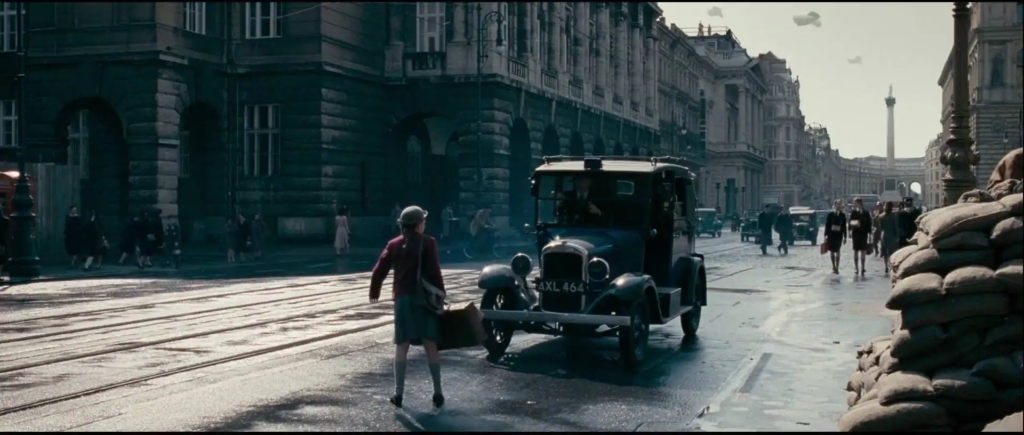
We find Anna Popplewell’s Susan before her sister does. She’s wearing a uniform for the same school and browsing a magazine rack. (The movie doesn’t make a big deal of it but there’s a newspaper being sold there announcing the raid is over.) A rather geeky looking boy (Ash Jones) tries to strike up a conversation with her.
Geeky Boy: You go to St. Finbarr’s?
Susan: That’s right.
Geeky Boy: I go to Hendon House. Across the road. I’ve seen you. Sitting by yourself.
Susan: Yes, well…I prefer to be left alone.
Pause
Geeky Boy: Me too! What’s your name?
Susan: Phyllis.
This dialogue is pretty hilarious though I feel like Susan is being kind of mean. (Her counterpart in the books always tried to avoid hurting people physically or emotionally.) Of course, other viewers might feel that this guy is being a clueless stalker and Susan (and the movie) should be harder on him. But there’s something I really appreciate about this little bit of comic filler. The Narnia books describe Susan, both in Narnia and her own world, as the most physically attractive of the Pevensies. And the idea persists among both lovers and haters of the series that she’s really into boys. But I’d argue that they’re the ones who are into her. She’s not particularly into them.[1]A major part of one book’s plot is actually Susan rejecting a suitor and him not responding well. The common perception of Susan being boy crazy comes from the final Narnia book, The Last … Continue reading So it gratifies me greatly that this movie is portraying a guy as being attracted to Susan and her being uninterested. Now if only the film could keep that up for its entire runtime!
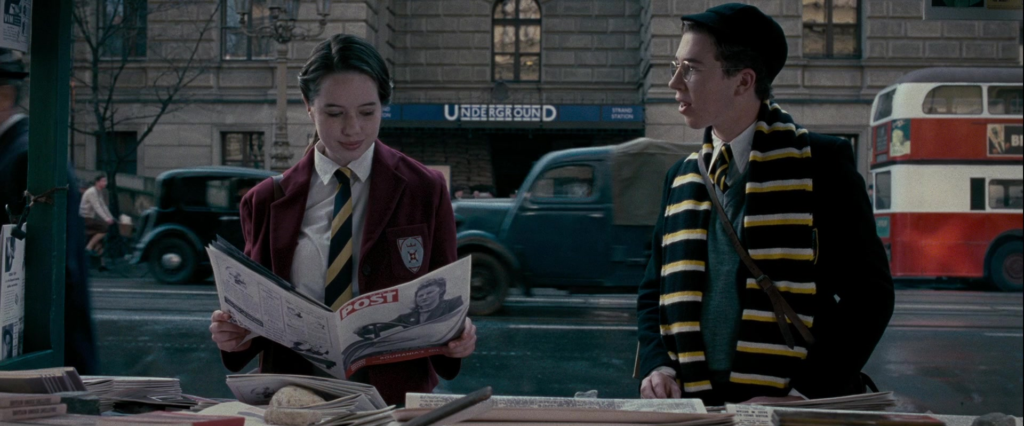
Anyway, Susan’s alias (Phyllis) is blown when Lucy runs up and tells her she’d better come quickly. The girls run into an underground railway station. (In the book, this station was above ground and rural by the way.) They find a crowd of other school children gathered to watch a fight between three boys. Two of them are handing the third his posterior. That third is Peter (William Moseley.) He and Susan lock eyes and she looks at him with reproach and disgust.


Just as Peter is getting his face pressed against the wall, another boy comes to his aid. It’s Edmund (Skandar Keynes.) He does his best, but Peter still takes quite a beating. Fortunately, two soldiers (John Bach and Jack Walley) come along and break up the fight. “Act your age,” one of them tells Peter. We then cut to the four Pevensies glumly seated on a bench with their luggage.
Edmund: You’re welcome.
Peter: I had it sorted.
Susan: What was it this time?
Peter: He bumped me.
Lucy: So you hit him?
Peter: No, after he bumped me, they tried to make me apologize. That’s when I hit him.
Um…yikes! In the literary Prince Caspian, Peter is a completely noble hero albeit one that makes a major mistake. He’s also a very humble hero and arguably as great a diplomat as he is a warrior. And here the adaptation has him brawling in public like a common hooligan. And it’s implied that this is something he’s been doing regularly for a while. Even if the movie really wanted to include this fight for the sake of more action, it would have been so easy to give Peter a more sympathetic reason for getting into it. He could have been defending a smaller boy against bullies.[2]That would have actually tied into his larger character arc in the movie anyway. We could have at least seen the two boys being really rude to Peter when they bumped into him, so that we’d be more likely to sympathize with him lashing out at them. Either of those ways to make Peter more sympathetic are so obvious that I’m not sure if I’m angry with the movie for not using them or impressed by it avoiding the obvious route.
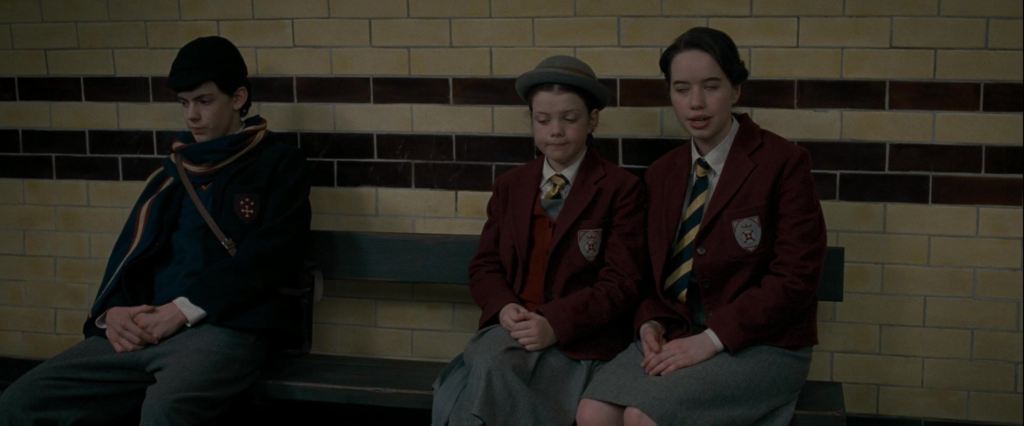
Perhaps most troublingly for fans of the book, we’ll learn in a matter of seconds that his issues stem from a sense of wounded pride and entitlement. For many fans, this one change to this one character is enough to ruin the adaptation for them. I can understand that if King Peter was a huge role model for you growing up. But while I consider Peter in the book to be admirable and well written, he’s not a particular favorite of mine and while there’s a lot I dislike about the execution of this character arc for him, as well as with William Moseley’s performance, which feels like he’s playing a different character from the likeable one in the last film, there’s also a lot that appeals to me about it conceptually. In The Lion, the Witch and the Wardrobe, Peter’s journey was all about him learning to have more confidence. I like that this sequel gives him the opposite arc rather than rehashing what we’ve already seen. Also, I don’t really get why so many kids’ movies, like The Lion, the Witch and the Wardrobe, feel that the main thing they need to teach their young viewers is to be more confident. Doubtless, there are some children who need to learn that but aren’t there also many-possibly even more-who suffer from overconfidence? Having the protagonist in a mainstream kids’ movie[3]I know I described this as being the Narnia movie most geared toward teenagers, but I also mentioned that I was speaking relatively. learn to be humble is an interesting and refreshing move if you ask me and one more in line with the broad themes of the Narnia books.[4]To be fair, while I’m not much interested in superheroes and haven’t kept up with the Marvel Cinematic Universe, I’m informed that many of its heroes start out as prideful and end … Continue reading
Back to the conversation.
Susan: Really! Is it that hard to just walk away?
Peter: I shouldn’t have to! I mean, don’t you ever get tired of being treated like a kid?
Edmund: Um, we are kids.
Peter: Well, I wasn’t always![5]Some fans have argued that English children in this time period were expected to mature as soon as possible what with World War II going on, making this angst on Peter’s part anachronistic. The … Continue reading It’s been a year. How long does he (Aslan) expect us to wait?
Susan: I think it’s time to accept that we live here. There’s no use pretending any different.
That last line is interesting in that it foreshadows events in the final Narnia story, The Last Battle. (If you haven’t read that one and don’t want anything spoiled for you, skip the rest of this paragraph.) There we’re informed that the older Susan has reached a point where if her siblings bring up Narnia, she says, “What wonderful memories you have! Fancy your still thinking about all those funny games we used to play when we were children.” Many readers find this development for the character random and it’s not a bad idea for an adaptation to foreshadow it though I feel like this one may be trying too hard to make Susan sympathetic. Still, that’s better than just dropping the plot point entirely. That would be both the easiest and the most cowardly route to take if you ask me.

Susan notices her unwanted admirer from the magazine rack heading her way. (Don’t worry. He’s not stalking her. He’s just going to take the same train.) Quickly, she instructs her brothers to pretend they’re talking to her. “We are talking to you,” Edmund points out. Suddenly, Lucy yells, “ow!” and jumps to her feet. Even though I’d read the book, I assumed at first, she was trying to create a distraction to help Susan. But no. “Something pinched me,” says Lucy. “Hey! Stop pulling,” says Peter, rising to his feet. “I’m not touching you,” Edmund replies. As a train rattles past them, he and Susan feel the pull too and get to their feet. As a book fan, I’m tickled to report that the order in which the characters feel the mysterious sensation is the same as in the text.
Susan: What is that?!
Lucy: It feels like magic.
Susan: Quick, everyone holds hands.
Edmund: I’m not holding your hand!
Nevertheless, the Pevensies’ do grab each other’s hands.[6]Ironically, in the book, Edmund got the line about the experience having the feel of magic and the suggestion that everyone hold hands. The walls of the railway station appear to be sucked away bit by bit while everyone besides our heroes is oblivious to it. Suddenly, they’re standing in an empty cave. The train disappears down the railway tunnel which transforms into the cave’s mouth, leading out onto a beautiful beach. This is a great magical transition though regrettably it conveys more of the impression that the world around the characters is being pulled away when it should be they who are being pulled out of the world.
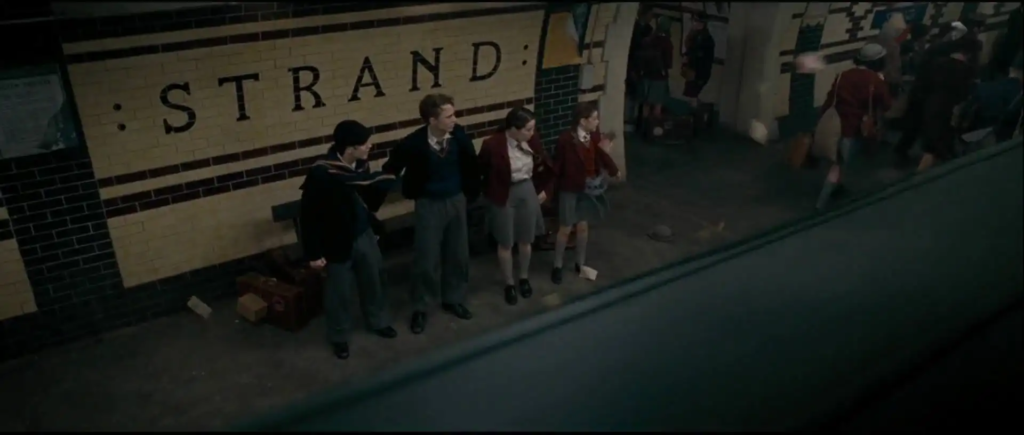
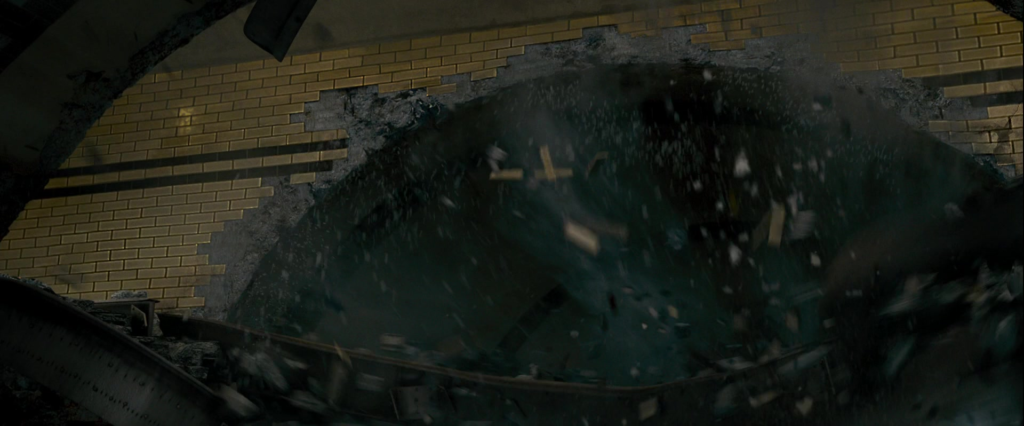
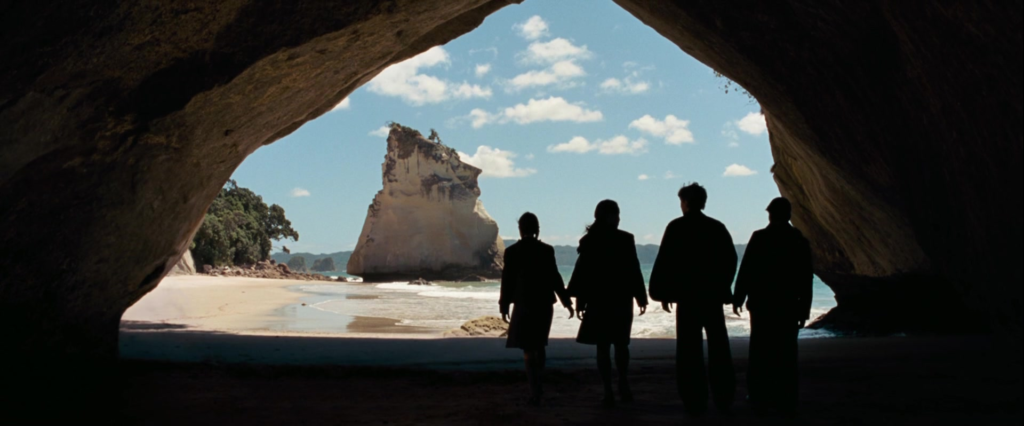
Lucy gives Susan a you-were-saying look. To her credit, Susan grins back and all four Pevensies run into the water, shedding their shoes and less comfortable school clothes, splashing each other and having a good time. In the book, they arrive in an uncomfortable thicket rather than a cave and are initially more shocked than delighted. They only happily rush into the water after they’ve picked their way out. I feel like that’s a little more believable, but I don’t mind the way the movie does the scene. I’ve described it earlier as being darker than the book or trying to be so anyway. This moment of joy is welcome, especially since it’s aided by a lovely location. We hear another old theme on the soundtrack, the one that played when all four Pevensies were in Narnia together for the first time in the last movie.
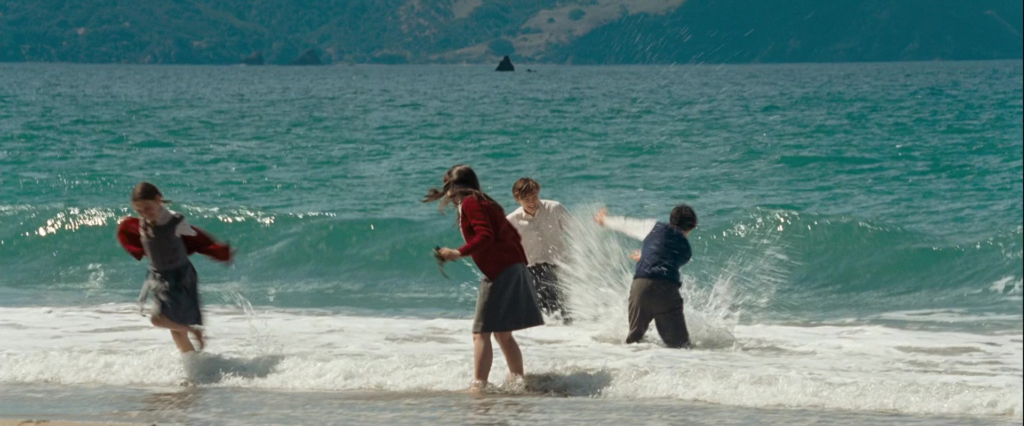
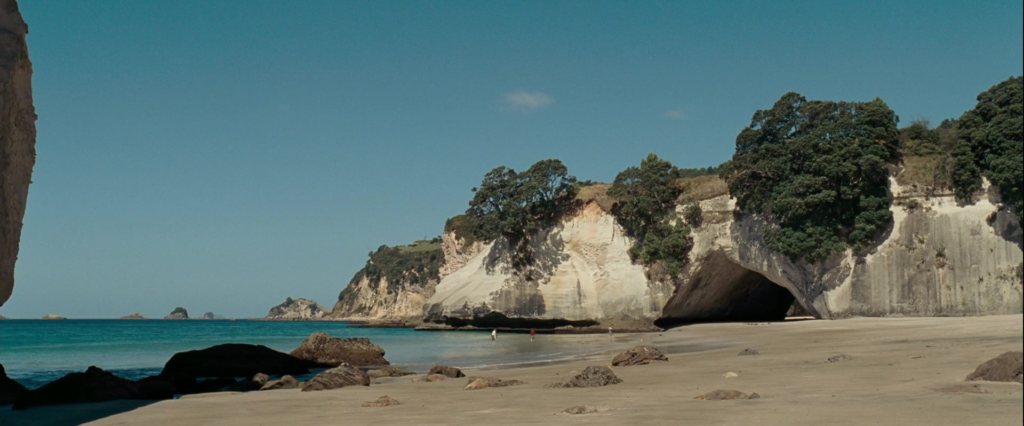

As the music fades, so does Edmund’s smile. That’s not to say he frowns; he just looks thoughtful. “Where do you suppose we are?” he asks. “Well, where do you think?” says Peter. “Well, I don’t remember any ruins in Narnia,” Edmund says. All four children grow silent as they stare up at the ancient remains of a castle on the cliffs above them. Then we see them exploring the site. Lucy eats an apple from an overgrown orchard. In the book, it takes the characters a long time to find this ruin and it’s stressed how grateful they are to find a source of food in the orchard as well as how sick they get before long of having nothing to eat but apples. I think I’m glad the movie trimmed all of that and also glad it still included the apples so that viewers would still get an idea of how the Pevensies avoid starvation.
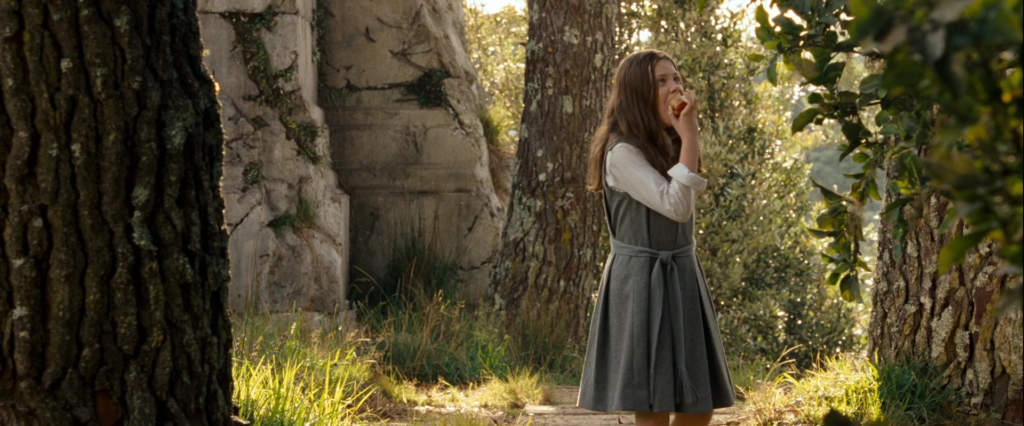
“I wonder who lived here,” Lucy says. Susan’s foot bumps against a tiny golden figurine of a centaur studded with ruby fragments. “I think we did,” she says, picking it up. “Hey, that’s mine,” says Edmund, “from my chess set.” Peter asks him which chess set. “I didn’t exactly have a solid gold chess in Finchley, did I?” says Edmund. As we’ll see, this adaptation generally tries to be more emotionally intense than its source material, so it’s interesting that this moment was actually more emotional in the book. There the chess piece belonged to Susan herself and the memories it raised nearly reduced her to tears. If the movie weren’t going to try to be more tearjerking than the book later, I would object to toning down the emotions in this scene. But since the movie does try that, I think it makes for better pacing not to get too sad too soon.
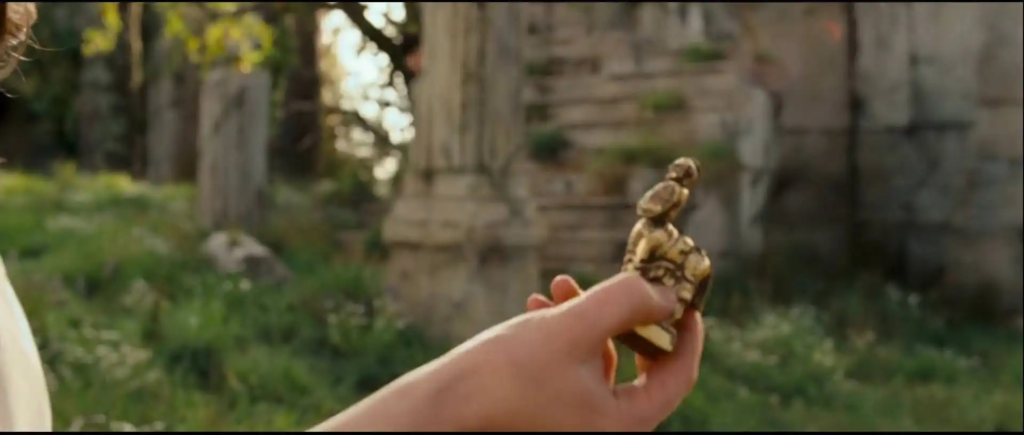
Lucy realizes something. “It can’t be,” she whispers. Then she grabs Peter by the hand and drags him to an open area that was once an interior. Susan and Edmund follow. “Don’t you see?” says Lucy. “Imagine walls and columns there and a glass roof.” The Pevensies realize that they’re standing exactly where their thrones once were. “Cair Paravel,” murmurs Peter. In the book, he was the one who figured out that the ruins were their old castle centuries after they’d left.[7]And incidentally he did so after evening had fallen. Giving that role to Lucy is typical of how the movie makes its version of Peter less heroic than C. S. Lewis’s but, to be fair, it’s one of the less annoying instances of it.
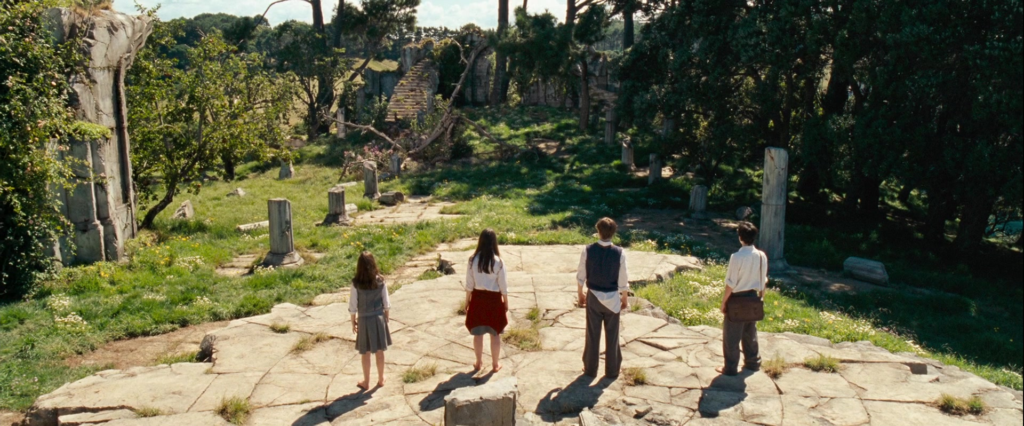
Next Week: What About All Those New Characters from the First Scene?
References
| ↑1 | A major part of one book’s plot is actually Susan rejecting a suitor and him not responding well. The common perception of Susan being boy crazy comes from the final Narnia book, The Last Battle, in which a character dismissively describes as being only interested in “nylons and lipstick and invitations.” But, as one fan has pointed out online (in a forum that is no longer available to read) clothes and makeup are often a way for girls to impress each other. |
|---|---|
| ↑2 | That would have actually tied into his larger character arc in the movie anyway. |
| ↑3 | I know I described this as being the Narnia movie most geared toward teenagers, but I also mentioned that I was speaking relatively. |
| ↑4 | To be fair, while I’m not much interested in superheroes and haven’t kept up with the Marvel Cinematic Universe, I’m informed that many of its heroes start out as prideful and end up being humbled, so maybe I’m exaggerating the cinematic Prince Caspian‘s uniqueness. It should be noted though that it was released the same summer as Iron Man, the first movie in the MCU. Maybe Narnia was just ahead of the trend. |
| ↑5 | Some fans have argued that English children in this time period were expected to mature as soon as possible what with World War II going on, making this angst on Peter’s part anachronistic. The undertones of get-off-my-lawn in these critiques make me unsure how seriously to take them but they sound legitimate enough, so I’m including them in this footnote. |
| ↑6 | Ironically, in the book, Edmund got the line about the experience having the feel of magic and the suggestion that everyone hold hands. |
| ↑7 | And incidentally he did so after evening had fallen. |
